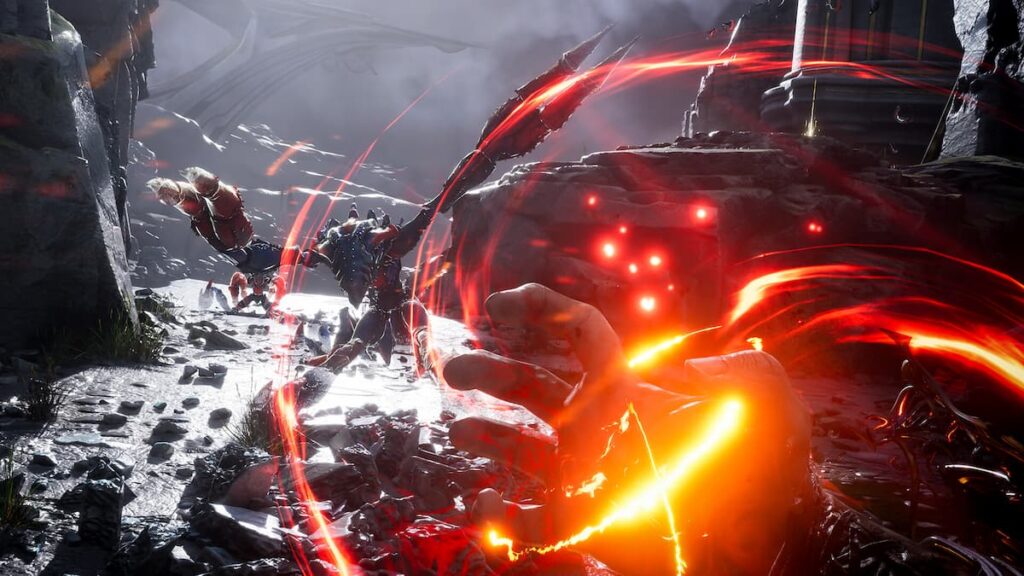
Image source: EA
I have a lot of sympathy for Ascendant Studios. Their debut title, Immortals of Aveum, seemed like a genuine effort to create a bombastic new IP outside of the stale franchises that dominate modern gaming. Immortals of Aveum was admirable but ultimately misguided, resulting in desperately poor sales figures and consequently half of the studio being laid off. There are many reasons for Immortals of Aveum‘s failure. But one that stands out more than any other, is Ascendant CEO’s insistence that the game is “100% AAA”. To all intents and purposes, Ascendant led Immortals of Aveum into the “AAA” trap.
Mere Mortals
When Immortals of Aveum released on 22 August 2023, it struggled. Its player count peaked at just 751 in launch week, according to SteamDB. Critics were generally lukewarm about it, with it averaging 72% “Fair” on OpenCritic, with less than half recommending it. Armored Core VI: Fires of Rubicon was due just two days later. Baldur’s Gate 3, released earlier in August, was still dominating players’ thoughts and playtime.
In short, it was a bloodbath. So much so, that just a few weeks after release, Ascendant CEO Bret Robbins announced that the studio was laying off 45% of its staff. Immortals of Aveum may live on for a while yet, as Robbins hopes in his interview on GamesIndustry.biz, but it showed itself to be very much mortal.
There’s no doubt that many factors contributed to the debut title’s failure. The aforementioned launch date between two giant releases certainly wouldn’t have helped. And, as Robbins reasonably posits in the same GamesIndustry.biz interview, new IPs face challenges that established franchises don’t. As much as we players like to say we want new experiences, we’re still understandably wary of the unknown. New IPs face an uphill battle to convey what they’re about. They need to answer one question in no uncertain terms: What is this game?
Hook, Line and Sinker
So, what is Immortals of Aveum? According to the game’s Steam page, it’s a “single-player first person magic shooter that tells the story of Jak as he joins an elite order of battlemages to save a world on the edge of abyss.”
Does anything stand out there as being particularly original or even noteworthy? Not for me. There’s nothing new there that we haven’t heard before, and the pre-release footage did little to dispel that notion. It was pretty and flashy, sure, but also distinctly lacking in substance. There was no discernible USP, no gameplay mechanics that appeared novel or intriguing setting that seized my attention. In short, it always looked bland and unfulfilling, like plain popcorn. It also didn’t help that the launch trailer was accompanied by a questionable music choice.

The games industry is so competitive at the moment, with 2023 being a famously ridiculous year in terms of stellar releases, that a game simply has to do something to stand out. As energetic and flashy as it is, Immortals of Aveum didn’t do that. Aside from guns being substituted for fast-paced magic attacks, it always looked like a deeply generic FPS. Many critics agreed that this turned out to be the case.
But, I’d argue that Immortals of Aveum‘s problems run even deeper than the aforementioned issues. By proudly positioning Immortals of Aveum as a “AAA” title, with all the baggage and expectation that affords, Ascendant Studios fell into the “AAA” trap.
The “AAA” Trap
The video games industry is obsessed with so-called “AAA” games. Nobody knows exactly what this means. Usually such titles are high-budget, majorly-marketed offerings from big publishers, but there’s no precise definition. Of course, this doesn’t stop publishers proudly proclaiming their games are “AAA”, or even “AAAA”, quite unironically.
The intention of such labelling is obvious: To signal to investors and players that the game in question is at the forefront of the industry. A title worthy of a $60 or $70 price tag. However, it comes with downsides. To achieve these lofty expectations takes significant resources. Immortals of Aveum reportedly cost an eye-watering $85m to develop, with another $40m contributed by publisher EA for marketing and distribution. Ballooning video game budgets are under particular scrutiny, with Insomniac’s recent Spider-Man 2 seemingly costing a staggering $300m to make. Even though Immortals of Aveum didn’t hit Spider-Man 2‘s crazy figures, spending over $100m to develop and market a new IP is undoubtedly risky, if not downright reckless.
Despite this, Ascendant CEO Bret Robbins still proudly insists that Immortals of Aveum is “100% AAA”. In the GamesIndustry.biz interview Robbins says this is a laudable testament to what a relatively small, new team can produce. But I can’t help but suspect it’s also in part to try to justify the ill-advised expenditure. Video games are difficult and costly to make — there’s no arguing with that. But it’s surely up to the studio heads and publishers to ensure that spending is proportional to the market potential of their game. Without a solid USP to differentiate itself from the stiff competition, Immortals of Aveum was always going to be up against it. A “AAA” budget only serves to exacerbate the failure.
On the Ascendancy
Despite Immortals of Aveum’s failure, I do hope that Ascendant Studios can rebuild. CEO Bret Robbins seems confident that the company can come back from their debut title’s underwhelming performance. To do so, I’d suggest the studio needs to pull themselves out of the “AAA” trap and focus on more unique, lower-budget games with less generic gameplay and storytelling and a more palatable price point. Robbins is right that we players are wary of new IPs, but we also recognize generic mediocrity and, conversely, uniqueness, when we say it. To suggest otherwise is doing the potential playerbase a grave disservice.
Immortals of Aveum isn’t a bad game, in my opinion. In fact, many aspects are perfectly competent. But, in this age of fierce competition, that’s not enough. If a game isn’t within an existing franchise, it has to stand out, showing at least a glimmer of inspiration. Sadly, Immortals of Aveum couldn’t do that.
Nevertheless, let’s hope that Ascendant Studios can learn their lessons, shun the “AAA” obsession and its associated trappings, and get back on track. Immortals of Aveum was a “AAA” game, perhaps, but that’s not implicitly a good thing. As soon as the studio recognizes that, perhaps it’ll find itself on the ascendancy.





